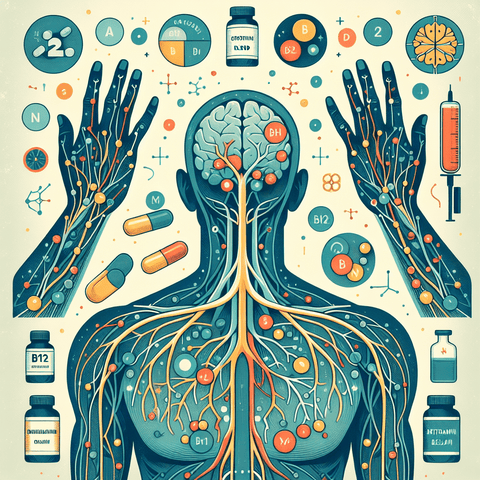Introduction
Vitamin B12 plays an indispensable role in human health, supporting a range of bodily functions from red blood cell production to neurological integrity. Often overlooked, this essential nutrient becomes critically important when deficiencies arise. When your body lacks Vitamin B12, it starts to show signs—subtle at first, but increasingly severe over time. From unexplained fatigue and nerve discomfort to cognitive challenges and muscle weakness, Vitamin B12 deficiency can affect multiple systems in the body. The good news? These symptoms are highly treatable, especially when identified early and managed through appropriate nutritional supplements.
Recognizing the early warning signs of Vitamin B12 deficiency is key to mitigating long-term damage and restoring vitality. While the pain and discomfort caused by a B12 deficiency may seem mysterious at first, they can often be directly linked to the vitamin’s biological functions. If left untreated, the condition can evolve into more serious health issues, some of which may become irreversible. However, with proper dietary supplementation—including forms such as methylcobalamin and cyanocobalamin—you can effectively support your nervous system, boost energy, and sharpen cognitive functions.
In this article, we explore the various symptoms and areas of discomfort associated with Vitamin B12 deficiency. You'll discover how and where it hurts—and more importantly, what you can do about it. From understanding the science behind the symptoms to choosing the right form of B12 supplements, we offer a complete guide to navigating your way to better health. And if you're searching for top-quality supplements, the comprehensive collections at Topvitamine.com have you covered.
Vitamin B12 Deficiency Symptoms: Recognizing the Signs that Matter for Nutritional Supplements
Vitamin B12, or cobalamin, is essential for DNA synthesis, red blood cell formation, and the maintenance of nervous system health. When deficient, numerous systems in the body begin to malfunction—a situation that manifests itself in a wide range of physical symptoms. Among the most common early signs of B12 deficiency are fatigue, weakness, shortness of breath, pale skin, and heart palpitations. These symptoms are directly linked to the vitamin’s role in red blood cell formation and oxygen transport. Without enough B12, your body struggles to produce the healthy red blood cells necessary to carry oxygen efficiently throughout the body.
Beyond the circulatory implications, Vitamin B12 also plays a pivotal role in DNA production and cell metabolism. Consequently, a deficiency adversely affects tissues with high turnover rates, such as the lining of the mouth and gastrointestinal tract. This can result in glossitis (a swollen, red tongue), mouth ulcers, and digestive disturbances like constipation or diarrhea. The neurological system, too, is incredibly vulnerable to deficiency, which we’ll explore in more detail later.
Anemia resulting from B12 deficiency (known as megaloblastic anemia) occurs when the bone marrow produces abnormally large red blood cells that cannot function properly. This condition amplifies fatigue and decreases stamina, making even routine tasks exhausting. These broad yet significant symptoms signal the importance of including a reliable B12 source in your nutritional regimen.
Early intervention with a suitable B12 supplement can reverse many of these symptoms. Products containing either methylcobalamin (the active form found naturally in the body) or cyanocobalamin (a more stable synthetic form) can be effective in correcting deficiency. You can find these high-quality supplements through trusted sources like Topvitamine.com, which offers a wide range of nutrient solutions designed to support optimal health.
Neurological Symptoms of Vitamin B12 Deficiency – When Nerves Call for Help
One of the most alarming consequences of Vitamin B12 deficiency is its effect on the nervous system. B12 is vital for the synthesis of myelin, the protective sheath that surrounds and insulates nerves. When B12 levels are low, myelin deteriorates, leading to disrupted nerve signaling and a spectrum of neurological symptoms. These can begin mildly with tingling in the hands or feet (referred to as paresthesia), and progress to more severe manifestations such as burning pain, numbness, and poor coordination.
Nerve-related symptoms often develop insidiously, especially in individuals who have been deficient over a longer period—such as the elderly or those with malabsorption issues like pernicious anemia or gastrointestinal disorders. Individuals with these issues are particularly susceptible to a breakdown of the nervous system's structural integrity, which over time may lead to diminished reflexes and even difficulty walking.
Recognizing these symptoms early and initiating appropriate supplementation is essential. Methylcobalamin, the biologically active form of B12, is often the preferred option for addressing neurological conditions as it directly participates in neurological repair mechanisms. Studies suggest that methylcobalamin may be more efficient in crossing the blood-brain barrier compared to cyanocobalamin, offering targeted support to nerve tissues.
High-dose B12 supplementation under medical supervision has shown positive outcomes in halting or even reversing nerve damage caused by deficiency. Alongside treatment, supporting nutrients such as Magnesium—available at Topvitamine.com—can enhance nerve function and cellular recovery. Timely and appropriate intervention is key, as prolonged B12-related neuropathy may become irreversible if not addressed at its early stages.
Nerve Pain and Discomfort: Unexplained Aches That Signal a Deeper Issue
Nerve pain, or peripheral neuropathy, related to Vitamin B12 deficiency can present as a frustrating and mysterious health issue. Individuals often report sensations of shooting pain, electric shocks, or burning—particularly in the lower extremities like feet and legs. This discomfort is a direct result of impaired nerve signaling due to myelin sheath degradation, a hallmark of insufficient Vitamin B12.
What sets B12-related neuropathy apart is that it doesn’t follow typical patterns associated with inflammation or mechanical compression (such as in carpal tunnel syndrome). Instead, the pain tends to be more diffuse, sometimes switching locations, and typically not responsive to standard painkillers. This kind of discomfort should prompt consideration of systemic causes, and Vitamin B12 deficiency is a prime suspect.
Supplementation therapy has shown considerable efficacy in resolving B12-deficiency-induced nerve pain. While over-the-counter analgesics may offer temporary relief, they do nothing to address the root cause. Methylcobalamin or intramuscular injections of cyanocobalamin, administered based on lab-confirmed deficiency, are more appropriate interventions. For those seeking effective over-the-counter support, top-quality B12 formula collections are readily accessible at reputable health stores online.
Most clinical guidelines recommend daily doses ranging from 1,000 mcg to 2,000 mcg for oral B12 supplements in moderate to severe deficiencies. However, always consult a healthcare professional for tailored advice. Supplementing with co-nutrients such as Vitamin D—which supports neuromuscular function—is also encouraged and can be explored at Topvitamine.com. Tackling the pain of B12 deficiency requires a focused approach to nutrition, informed by both science and individual needs.
Fatigue and Low Energy Levels: The Hidden Costs of B12 Deficiency
Fatigue is one of the most frequently reported and often disabling symptoms of Vitamin B12 deficiency. This type of tiredness goes beyond everyday exhaustion; it is persistent, unrelenting, and not alleviated by rest. At its core, this extreme depletion of energy ties back to B12’s essential function in red blood cell production.
Red blood cells transport oxygen from the lungs to other tissues, a process that is heavily dependent on adequate levels of Vitamin B12. Without enough B12, your body produces abnormally large (megaloblastic) red blood cells that fail to function effectively. As a result, oxygen delivery throughout the body suffers, leading to generalized weakness, shortness of breath, and mental fatigue.
Fortunately, fatigue caused by B12 deficiency tends to respond well to supplementation. Once adequate levels of the vitamin are restored, energy production quickly rebounds. Sublingual B12 supplements, often in the form of methylcobalamin, are highly bioavailable and can be taken daily for ongoing support. For proactive energy health, pairing B12 with magnesium—a mineral known for its energy metabolism support—can be found at Topvitamine.com.
Practical tips for maximizing B12 absorption include choosing sublingual lozenges or liquid formulations, taking B12 supplements on an empty stomach, and avoiding substances that inhibit absorption (like excessive alcohol and certain medications). By giving your body the tools it needs to regenerate and function efficiently, you can restore your zest for life and prevent the draining consequences of persistent fatigue.
Cognitive Issues: When Memory and Concentration Falter
Vitamin B12 deficiency doesn't just harm your body—it can also impair your mind. Numerous studies have linked low B12 levels to cognitive dysfunction, particularly in older adults. Symptoms include forgetfulness, difficulty concentrating, confusion, irritability, and brain fog. In more severe cases, long-standing B12 deficiency can mimic the early stages of dementia.
B12 supports both the structural integrity of neurons and the synthesis of neurotransmitters such as dopamine and serotonin. When B12 is lacking, nerve signals slow, disrupting communication between brain cells. This results in slower cognitive processing, memory lapses, and decreased executive function.
Timely intervention with B12 supplementation can improve cognitive symptoms, particularly in the early stages. Methylcobalamin is the form most often recommended for neurological and cognitive applications due to its superior bioavailability and impact on nerve cell maintenance. Vegan or vegetarian individuals, who are at higher risk for B12 deficiency, should consider supplementing daily to maintain cognitive sharpness.
In support of brain health and mental clarity, look to high-quality nutritional products from respected sources like Topvitamine.com. Omega-3 fatty acids, in particular DHA, work synergistically with B12 to support neuroplasticity and cognition. Prioritizing brain-supportive nutrition today can greatly reduce the likelihood of cognitive impairment tomorrow.
Muscle Weakness: When Weakness Spreads Beyond Fatigue
Muscle strength and coordination require more than just physical training—they demand proper nutrient support. B12 deficiency affects muscle tissue indirectly by impairing nerve signals and restricting oxygen supplies. As such, one common symptom that arises from low B12 is muscular weakness, particularly in the lower limbs.
Because muscles rely on clear communication from peripheral nerves to execute movement and maintain tone, Vitamin B12’s role in nerve health also impacts muscular capacity. If left unchecked, B12 deficiency can lead to decreased balance, frequent stumbling, and even difficulty standing up from a seated position. This is particularly problematic in older adults, where such symptoms may be mistakenly attributed to aging rather than nutritional deficiency.
The path to muscular recovery lies in a holistic supplement strategy, including daily administration of B12 in absorbable forms, as well as co-supplementation with vitamins D, K2, and magnesium. Products available at Topvitamine.com offer combinations of these vital nutrients tailored toward musculoskeletal support. These help regenerate nerve axons and contribute to proper muscle contraction and coordination.
Muscle weakness is not just an inconvenient symptom—it may be a red flag for a deeper systemic issue. With consistent supplementation and dietary support, it's possible to restore physical performance and reduce the risk of injury due to falls and poor coordination. As always, regular monitoring through blood tests helps ensure that your recovery is on track and complete.
Conclusion
Vitamin B12 deficiency presents a diverse array of symptoms that span physical, neurological, and cognitive domains. From nerve pain and persistent fatigue to cognitive fog and muscle weakness, B12’s critical role in human health cannot be overstated. Yet, the good news remains: B12 deficiency is one of the most treatable nutritional conditions, provided it is recognized early and addressed effectively.
Nutritional supplements offer an excellent strategy for restoring B12 levels, especially for individuals at risk such as vegans, vegetarians, and older adults. Choosing biologically active and absorbable forms of B12 like methylcobalamin can deliver targeted relief. Pairing your supplementation regimen with synergistic nutrients such as magnesium, vitamin D, and omega-3s—available at Topvitamine.com—can further enhance results and promote long-term wellness.
Recognizing where it hurts and understanding why it hurts are important first steps. Yet the most important action you can take is seeking professional guidance and committing to an evidence-based supplementation plan. Begin today, and put yourself on the path to health optimization, mental clarity, and physical vitality.
Q&A Section
Q: What are the early symptoms of Vitamin B12 deficiency?
A: Early symptoms can include fatigue, tingling in hands and feet, pale skin, irritability, and occasional memory lapses.
Q: Can B12 supplements help with nerve pain?
A: Yes. Supplements like methylcobalamin support nerve repair and can reduce nerve pain or discomfort associated with deficiency.
Q: What type of B12 supplement is best for neurological symptoms?
A: Methylcobalamin is often recommended for neurological issues due to its high bioavailability and ability to cross the blood-brain barrier.
Q: How can I boost B12 absorption?
A: Use sublingual or liquid B12 forms, take them on an empty stomach, and avoid alcohol or interfering medications.
Q: Can B12 deficiency cause permanent damage?
A: Yes, especially neurological damage. Early diagnosis and treatment are critical to preventing long-term complications.
Important Keywords
- Vitamin B12 deficiency
- B12 nerve pain
- B12 fatigue symptoms
- Neurological symptoms of B12 deficiency
- Methylcobalamin supplements
- Muscle weakness and B12
- B12 for brain fog
- Topvitamine B12 supplements
- Nutritional support for nerve health
- B12 deficiency recovery



